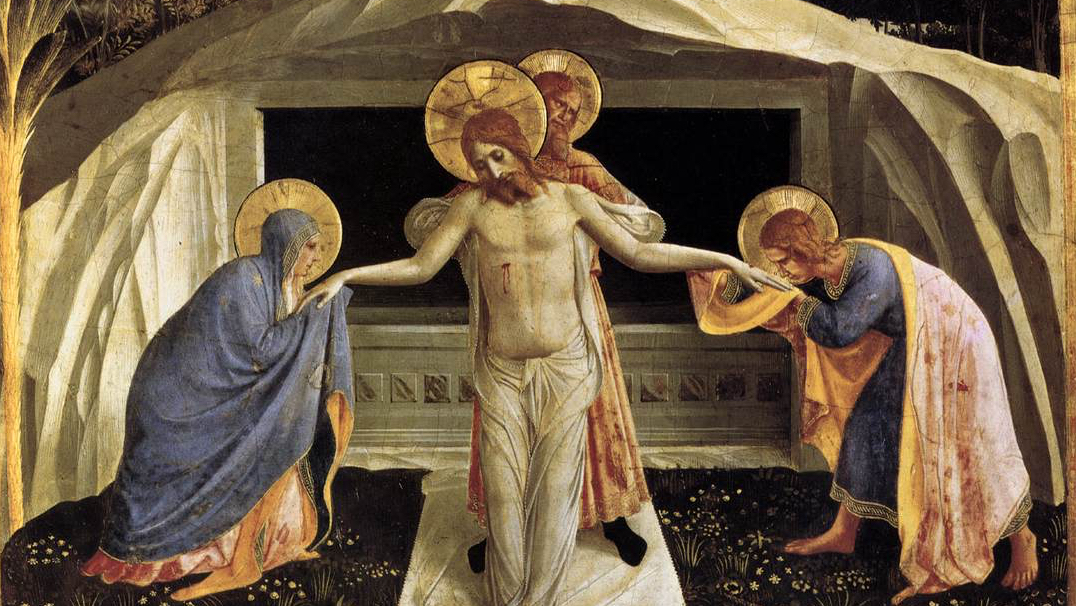On Good Friday, we meet to participate in the liturgies of the Church that remember and commemorate the Passion and Death of our Lord and Savior Jesus. To a nonbeliever, it may seem odd that so many of the faithful gather today to immortalize the suffering and death of one individual in human history. But we are here today specifically to commemorate the events of that very first Good Friday.
We, the faithful followers of Christ, hear the story of our Lord’s passion and death so often that it is easy for us to become immune to the brutality of the event. But I ask you to focus not on the brutality of the event that we remember today, because focusing on that brutality can blind one to the truth. Rather focus on the love of God that is the real truth behind that event.
The Catechism of the Catholic Church, in a section titled “Christ’s Redemptive Death in God’s Plan of Salvation”, it says that “God manifests that his plan for us is one of benevolent love.” (CCC-604) And Scripture tells us that, “God shows his love for us in that while we were yet sinners Christ died for us.” (Romans 5:8)
I once had a young man ask me, “Why did Jesus have to die such a cruel and painful death?” I am sure that many of us have, at times, asked ourselves that very same question. But in order to answer that question, we have to understand that God the Father was not angry with His Son Jesus or with humanity on that terrible day. On the contrary, the suffering and death of our Lord and Savior Jesus was the greatest act of love imaginable. For it truly revealed to us the very heart of our God. A heart of unconditional love!
Christ’s act of self-sacrifice was done in loving obedience to His Father. Again, the Catechism of the Catholic Church tells us that, “By embracing in his human heart the Father’s love for men, Jesus “loved them to the end”, for “greater love has no man than to lay down his life for his friends.” In suffering and death his humanity became the free and perfect instrument of his divine love, which desires the salvation of men. Indeed, out of love for his Father and for men, whom the Father wants to save, Jesus freely accepted his Passion and death. (CCC-609)
Think of it this way. Our heavenly Father was not pouring out His wrath upon His Son that day, rather, Jesus was offering up His unconditional love to His heavenly Father on behalf of all mankind. In the suffering that our Lord was subjected to that day, humanity was, in reality, pouring out its hostility and hatred upon what they saw in the life of Jesus. The people were literally putting to death the author of life. And what is so amazing is the fact that Jesus freely chose to allow them to do this to Him. He even asked the Father to, “Forgive them for they know not what they do” (Luke 23:34)
Jesus, humble and meek, silently endured the worst that this world had to give, and was led to the slaughter like a sacrificial lamb that was being offered to atone for the sins of the people. By His sacrifice, Jesus demonstrated the unconditional love that God has for all of humanity. God loves all of His sons and daughters in this world so much that He freely offers His gift of forgiveness and salvation to any and all who will simply accept His love.
So if we meditate on the mystery of God’s gift of salvation, we see that the mission and purpose of Jesus’ life and ministry was twofold. First and foremost, Jesus modeled for humankind the fullness of God’s mercy and forgiveness. A mercy and forgiveness that is freely offered to a sinful humanity! Secondly, Jesus’ life was a model for us of the perfection of the Love that is God.
John tells us in Chapter 3 Verses 16 & 17 that, “God so loved the world that He gave His only Son, that whoever believes in Him may not die but may have eternal life. God did not send His Son into the world to condemn the world, but that the world might be saved through Him.” Now think of that Gospel passage in the light of what John tells us in Chapter 13 Verse 34 in which Jesus said, “Love one another as I have loved you”.
Both passages are familiar! But when you read them in light of the life, death and resurrection of Jesus, you come to understand that the starting point in understanding the Easter mystery isn’t God’s anger. It’s God’s love.
The God revealed to us in the life of Jesus was a God of love. Our God became one of us so that we could come to know who our God really is. So we could come to know Him as one who identifies with us, who goes with us, who suffers with us, and who loves us to the point of providing us with an example of how to live our lives.
We get our strength for living from the life of Jesus, His mission, His teachings and His parables. We get our hope for what comes next from the Crucifixion, Death and Resurrection of Jesus. To ask which is more important, Jesus’ life or His death is like asking which wing on an airplane is more important. You need them both to fly.
In trying to comprehend the reasoning behind Christ’s suffering, it helps to understand that we live in a world filled with problems, pain and suffering. And Jesus introduced us to a God who is not immune to our plight, for He has experienced the worst that this world can offer.
In the end, we find that when we attempt to reason out an answer to the question of why Jesus died, we discover that our search will ultimately require our own personal response. Anyone who reasons out his or her own faith will walk that journey of discovery. And in taking that journey, I offer you some points to consider.
- First of all, remember that Jesus did nothing on His own. He spent hours in prayer with His Father. And Jesus did not have to die as He did. He chose to. We hear His words of explanation at every Eucharist. “My blood will be shed for you and for all so that sins may be forgiven.” Jesus chose to endure the worst that the world could offer, to show us that, by the love and power of God, we have forgiveness in the name of Jesus, and even death itself is overcome.
- Secondly, if you’re stuck with an image of God as being angry and judgmental, waiting to condemn all who stumble and fall, remember Jesus said that He came for the exact opposite reason. He said, “I came that you might have life; and have it more abundantly.” (John 10:10) Jesus came to show us God’s love and the length to which God will go to save us. Jesus introduced us to a God who is good and loving and merciful.
- Thirdly, Jesus is not asking us to simply acknowledge the reality of His life, death and resurrection. He is asking us to accept the way of life that He offers and be changed by it.
- And lastly, remember that our God took on the form of humanity so that no one can say that Jesus doesn’t understand. After all, he was conceived and carried in the womb so He understands the human condition. He was born in a barn so He knows what it feels like to be poor. He fled to Egypt so He understands culture shock and He understands what it’s like to live as a refugee. He lived in Nazareth so He experienced the ghettos. He was not accepted by many so He knows what rejection is like. He hung nailed to a cross unable to move, so He knows what it feels like to be in agony, and to feel trapped and helpless.
Jesus freely chose to experience all those things so that we could feel safe in sharing our experiences with Him. We can trust Him because He’s been there. He understands, and He cares.
As brothers and sisters in the family of God, we must do more than just “talk the talk”. We have to walk the path of love, service and self-sacrifice, just as Jesus did, for only then will we truly experience the abundant life that He offers us.
The agony of the cross that we commemorate today is the ultimate expression of God’s love for us. So we need to focus not on the brutality of the event, but rather to focus on the love of God that is the truth behind that event.








